Approaches to Health: Definitions, Models, and Sociological Views
VerifiedAdded on 2020/07/22
|7
|2083
|50
Report
AI Summary
This report provides a comprehensive analysis of health and ill health, beginning with contrasting definitions and exploring various explanatory models such as biomedical, holistic, and personal behavior models. It delves into factors influencing how people react to ill health, considering social, mental, and behavioral aspects. The report also evaluates contrasting sociological perspectives, including functionalist and Marxist perspectives, providing a nuanced understanding of health and illness within societal contexts. The analysis is supported by a case study, which revolves around the ill health of Emma, examining her physical, mental, and emotional challenges. The report concludes by summarizing the key findings and emphasizing the importance of understanding diverse approaches to health and illness. The references include books, journals, and online resources that support the analysis.
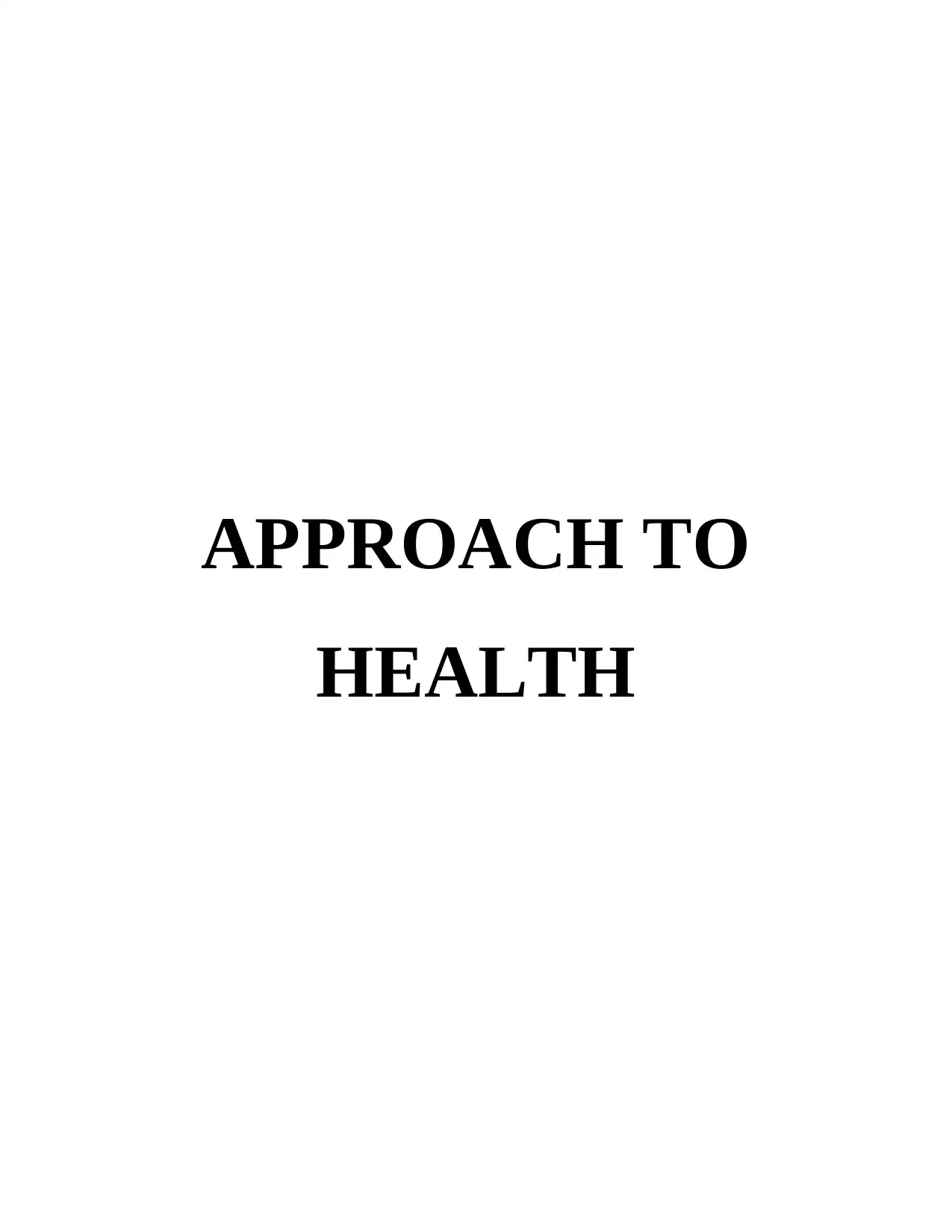
APPROACH TO
HEALTH
HEALTH
Paraphrase This Document
Need a fresh take? Get an instant paraphrase of this document with our AI Paraphraser
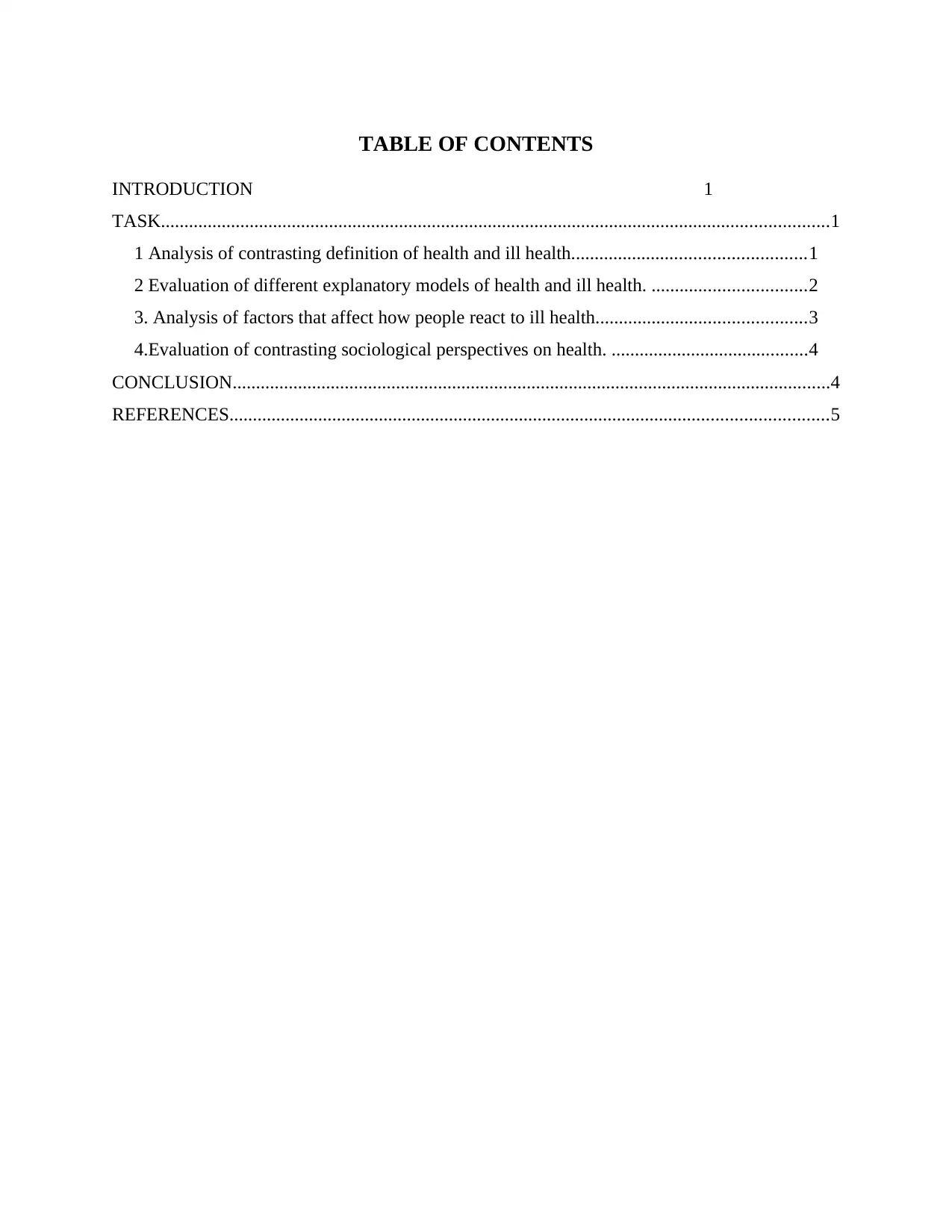
TABLE OF CONTENTS
INTRODUCTION 1
TASK...............................................................................................................................................1
1 Analysis of contrasting definition of health and ill health..................................................1
2 Evaluation of different explanatory models of health and ill health. .................................2
3. Analysis of factors that affect how people react to ill health.............................................3
4.Evaluation of contrasting sociological perspectives on health. ..........................................4
CONCLUSION................................................................................................................................4
REFERENCES................................................................................................................................5
INTRODUCTION 1
TASK...............................................................................................................................................1
1 Analysis of contrasting definition of health and ill health..................................................1
2 Evaluation of different explanatory models of health and ill health. .................................2
3. Analysis of factors that affect how people react to ill health.............................................3
4.Evaluation of contrasting sociological perspectives on health. ..........................................4
CONCLUSION................................................................................................................................4
REFERENCES................................................................................................................................5
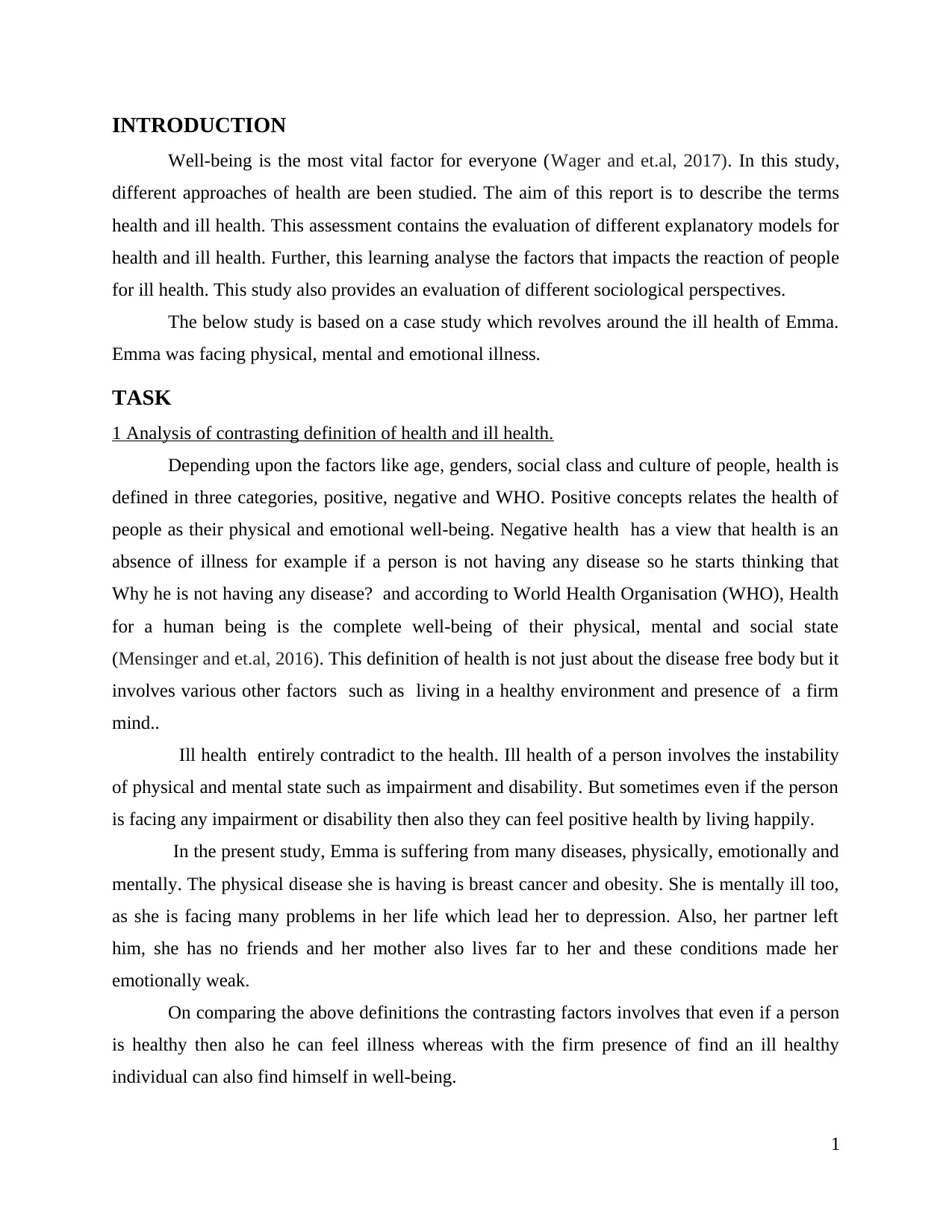
INTRODUCTION
Well-being is the most vital factor for everyone (Wager and et.al, 2017). In this study,
different approaches of health are been studied. The aim of this report is to describe the terms
health and ill health. This assessment contains the evaluation of different explanatory models for
health and ill health. Further, this learning analyse the factors that impacts the reaction of people
for ill health. This study also provides an evaluation of different sociological perspectives.
The below study is based on a case study which revolves around the ill health of Emma.
Emma was facing physical, mental and emotional illness.
TASK
1 Analysis of contrasting definition of health and ill health.
Depending upon the factors like age, genders, social class and culture of people, health is
defined in three categories, positive, negative and WHO. Positive concepts relates the health of
people as their physical and emotional well-being. Negative health has a view that health is an
absence of illness for example if a person is not having any disease so he starts thinking that
Why he is not having any disease? and according to World Health Organisation (WHO), Health
for a human being is the complete well-being of their physical, mental and social state
(Mensinger and et.al, 2016). This definition of health is not just about the disease free body but it
involves various other factors such as living in a healthy environment and presence of a firm
mind..
Ill health entirely contradict to the health. Ill health of a person involves the instability
of physical and mental state such as impairment and disability. But sometimes even if the person
is facing any impairment or disability then also they can feel positive health by living happily.
In the present study, Emma is suffering from many diseases, physically, emotionally and
mentally. The physical disease she is having is breast cancer and obesity. She is mentally ill too,
as she is facing many problems in her life which lead her to depression. Also, her partner left
him, she has no friends and her mother also lives far to her and these conditions made her
emotionally weak.
On comparing the above definitions the contrasting factors involves that even if a person
is healthy then also he can feel illness whereas with the firm presence of find an ill healthy
individual can also find himself in well-being.
1
Well-being is the most vital factor for everyone (Wager and et.al, 2017). In this study,
different approaches of health are been studied. The aim of this report is to describe the terms
health and ill health. This assessment contains the evaluation of different explanatory models for
health and ill health. Further, this learning analyse the factors that impacts the reaction of people
for ill health. This study also provides an evaluation of different sociological perspectives.
The below study is based on a case study which revolves around the ill health of Emma.
Emma was facing physical, mental and emotional illness.
TASK
1 Analysis of contrasting definition of health and ill health.
Depending upon the factors like age, genders, social class and culture of people, health is
defined in three categories, positive, negative and WHO. Positive concepts relates the health of
people as their physical and emotional well-being. Negative health has a view that health is an
absence of illness for example if a person is not having any disease so he starts thinking that
Why he is not having any disease? and according to World Health Organisation (WHO), Health
for a human being is the complete well-being of their physical, mental and social state
(Mensinger and et.al, 2016). This definition of health is not just about the disease free body but it
involves various other factors such as living in a healthy environment and presence of a firm
mind..
Ill health entirely contradict to the health. Ill health of a person involves the instability
of physical and mental state such as impairment and disability. But sometimes even if the person
is facing any impairment or disability then also they can feel positive health by living happily.
In the present study, Emma is suffering from many diseases, physically, emotionally and
mentally. The physical disease she is having is breast cancer and obesity. She is mentally ill too,
as she is facing many problems in her life which lead her to depression. Also, her partner left
him, she has no friends and her mother also lives far to her and these conditions made her
emotionally weak.
On comparing the above definitions the contrasting factors involves that even if a person
is healthy then also he can feel illness whereas with the firm presence of find an ill healthy
individual can also find himself in well-being.
1
⊘ This is a preview!⊘
Do you want full access?
Subscribe today to unlock all pages.

Trusted by 1+ million students worldwide
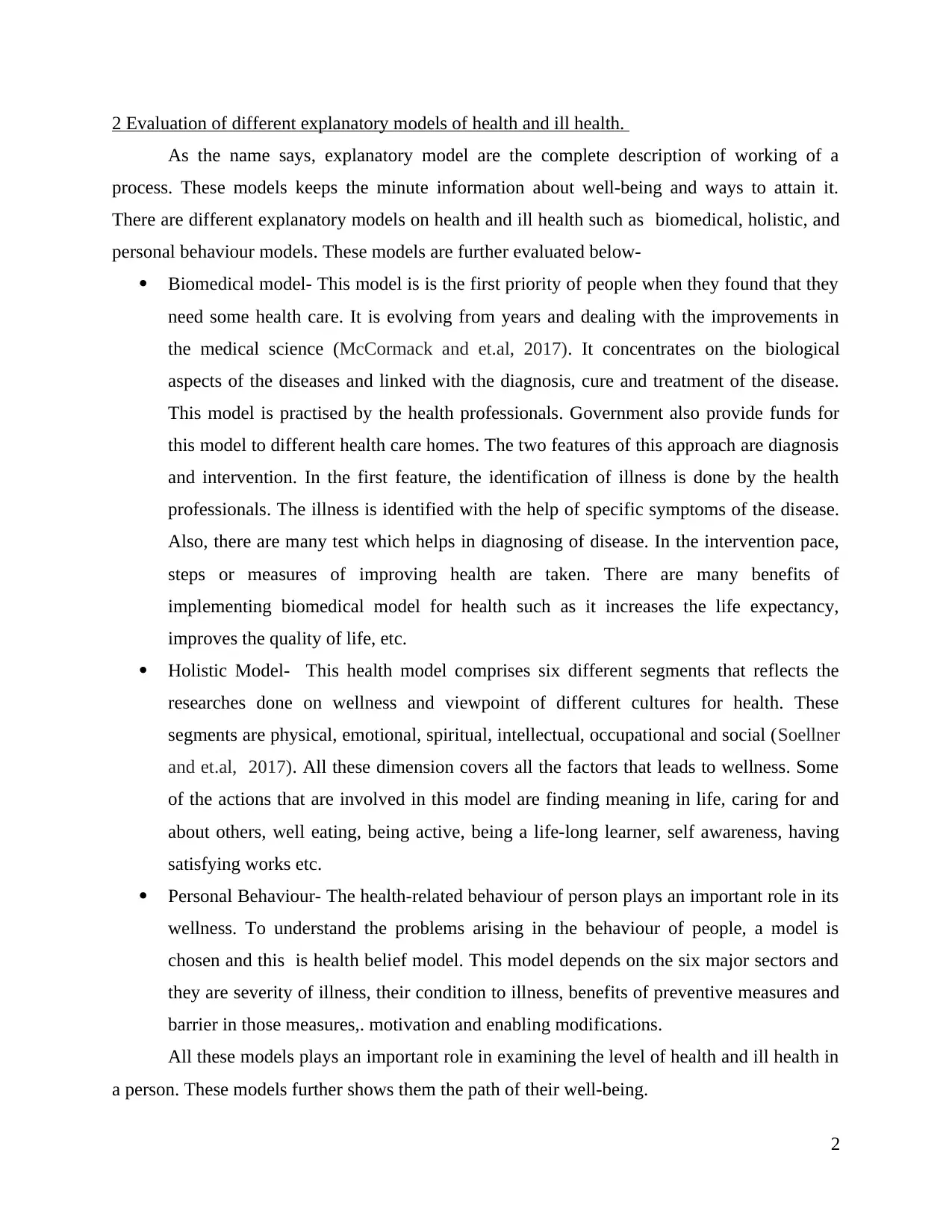
2 Evaluation of different explanatory models of health and ill health.
As the name says, explanatory model are the complete description of working of a
process. These models keeps the minute information about well-being and ways to attain it.
There are different explanatory models on health and ill health such as biomedical, holistic, and
personal behaviour models. These models are further evaluated below-
Biomedical model- This model is is the first priority of people when they found that they
need some health care. It is evolving from years and dealing with the improvements in
the medical science (McCormack and et.al, 2017). It concentrates on the biological
aspects of the diseases and linked with the diagnosis, cure and treatment of the disease.
This model is practised by the health professionals. Government also provide funds for
this model to different health care homes. The two features of this approach are diagnosis
and intervention. In the first feature, the identification of illness is done by the health
professionals. The illness is identified with the help of specific symptoms of the disease.
Also, there are many test which helps in diagnosing of disease. In the intervention pace,
steps or measures of improving health are taken. There are many benefits of
implementing biomedical model for health such as it increases the life expectancy,
improves the quality of life, etc.
Holistic Model- This health model comprises six different segments that reflects the
researches done on wellness and viewpoint of different cultures for health. These
segments are physical, emotional, spiritual, intellectual, occupational and social (Soellner
and et.al, 2017). All these dimension covers all the factors that leads to wellness. Some
of the actions that are involved in this model are finding meaning in life, caring for and
about others, well eating, being active, being a life-long learner, self awareness, having
satisfying works etc.
Personal Behaviour- The health-related behaviour of person plays an important role in its
wellness. To understand the problems arising in the behaviour of people, a model is
chosen and this is health belief model. This model depends on the six major sectors and
they are severity of illness, their condition to illness, benefits of preventive measures and
barrier in those measures,. motivation and enabling modifications.
All these models plays an important role in examining the level of health and ill health in
a person. These models further shows them the path of their well-being.
2
As the name says, explanatory model are the complete description of working of a
process. These models keeps the minute information about well-being and ways to attain it.
There are different explanatory models on health and ill health such as biomedical, holistic, and
personal behaviour models. These models are further evaluated below-
Biomedical model- This model is is the first priority of people when they found that they
need some health care. It is evolving from years and dealing with the improvements in
the medical science (McCormack and et.al, 2017). It concentrates on the biological
aspects of the diseases and linked with the diagnosis, cure and treatment of the disease.
This model is practised by the health professionals. Government also provide funds for
this model to different health care homes. The two features of this approach are diagnosis
and intervention. In the first feature, the identification of illness is done by the health
professionals. The illness is identified with the help of specific symptoms of the disease.
Also, there are many test which helps in diagnosing of disease. In the intervention pace,
steps or measures of improving health are taken. There are many benefits of
implementing biomedical model for health such as it increases the life expectancy,
improves the quality of life, etc.
Holistic Model- This health model comprises six different segments that reflects the
researches done on wellness and viewpoint of different cultures for health. These
segments are physical, emotional, spiritual, intellectual, occupational and social (Soellner
and et.al, 2017). All these dimension covers all the factors that leads to wellness. Some
of the actions that are involved in this model are finding meaning in life, caring for and
about others, well eating, being active, being a life-long learner, self awareness, having
satisfying works etc.
Personal Behaviour- The health-related behaviour of person plays an important role in its
wellness. To understand the problems arising in the behaviour of people, a model is
chosen and this is health belief model. This model depends on the six major sectors and
they are severity of illness, their condition to illness, benefits of preventive measures and
barrier in those measures,. motivation and enabling modifications.
All these models plays an important role in examining the level of health and ill health in
a person. These models further shows them the path of their well-being.
2
Paraphrase This Document
Need a fresh take? Get an instant paraphrase of this document with our AI Paraphraser
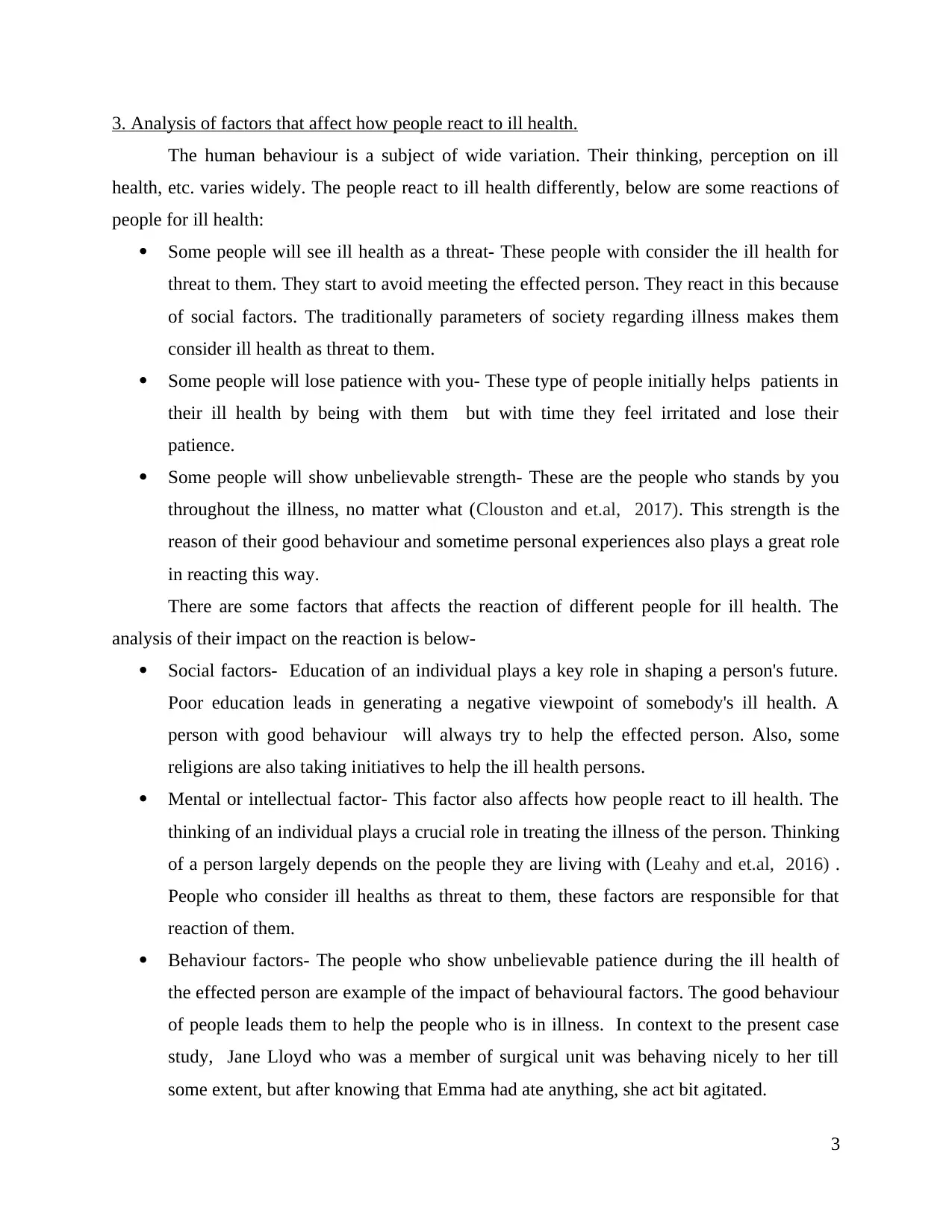
3. Analysis of factors that affect how people react to ill health.
The human behaviour is a subject of wide variation. Their thinking, perception on ill
health, etc. varies widely. The people react to ill health differently, below are some reactions of
people for ill health:
Some people will see ill health as a threat- These people with consider the ill health for
threat to them. They start to avoid meeting the effected person. They react in this because
of social factors. The traditionally parameters of society regarding illness makes them
consider ill health as threat to them.
Some people will lose patience with you- These type of people initially helps patients in
their ill health by being with them but with time they feel irritated and lose their
patience.
Some people will show unbelievable strength- These are the people who stands by you
throughout the illness, no matter what (Clouston and et.al, 2017). This strength is the
reason of their good behaviour and sometime personal experiences also plays a great role
in reacting this way.
There are some factors that affects the reaction of different people for ill health. The
analysis of their impact on the reaction is below-
Social factors- Education of an individual plays a key role in shaping a person's future.
Poor education leads in generating a negative viewpoint of somebody's ill health. A
person with good behaviour will always try to help the effected person. Also, some
religions are also taking initiatives to help the ill health persons.
Mental or intellectual factor- This factor also affects how people react to ill health. The
thinking of an individual plays a crucial role in treating the illness of the person. Thinking
of a person largely depends on the people they are living with (Leahy and et.al, 2016) .
People who consider ill healths as threat to them, these factors are responsible for that
reaction of them.
Behaviour factors- The people who show unbelievable patience during the ill health of
the effected person are example of the impact of behavioural factors. The good behaviour
of people leads them to help the people who is in illness. In context to the present case
study, Jane Lloyd who was a member of surgical unit was behaving nicely to her till
some extent, but after knowing that Emma had ate anything, she act bit agitated.
3
The human behaviour is a subject of wide variation. Their thinking, perception on ill
health, etc. varies widely. The people react to ill health differently, below are some reactions of
people for ill health:
Some people will see ill health as a threat- These people with consider the ill health for
threat to them. They start to avoid meeting the effected person. They react in this because
of social factors. The traditionally parameters of society regarding illness makes them
consider ill health as threat to them.
Some people will lose patience with you- These type of people initially helps patients in
their ill health by being with them but with time they feel irritated and lose their
patience.
Some people will show unbelievable strength- These are the people who stands by you
throughout the illness, no matter what (Clouston and et.al, 2017). This strength is the
reason of their good behaviour and sometime personal experiences also plays a great role
in reacting this way.
There are some factors that affects the reaction of different people for ill health. The
analysis of their impact on the reaction is below-
Social factors- Education of an individual plays a key role in shaping a person's future.
Poor education leads in generating a negative viewpoint of somebody's ill health. A
person with good behaviour will always try to help the effected person. Also, some
religions are also taking initiatives to help the ill health persons.
Mental or intellectual factor- This factor also affects how people react to ill health. The
thinking of an individual plays a crucial role in treating the illness of the person. Thinking
of a person largely depends on the people they are living with (Leahy and et.al, 2016) .
People who consider ill healths as threat to them, these factors are responsible for that
reaction of them.
Behaviour factors- The people who show unbelievable patience during the ill health of
the effected person are example of the impact of behavioural factors. The good behaviour
of people leads them to help the people who is in illness. In context to the present case
study, Jane Lloyd who was a member of surgical unit was behaving nicely to her till
some extent, but after knowing that Emma had ate anything, she act bit agitated.
3
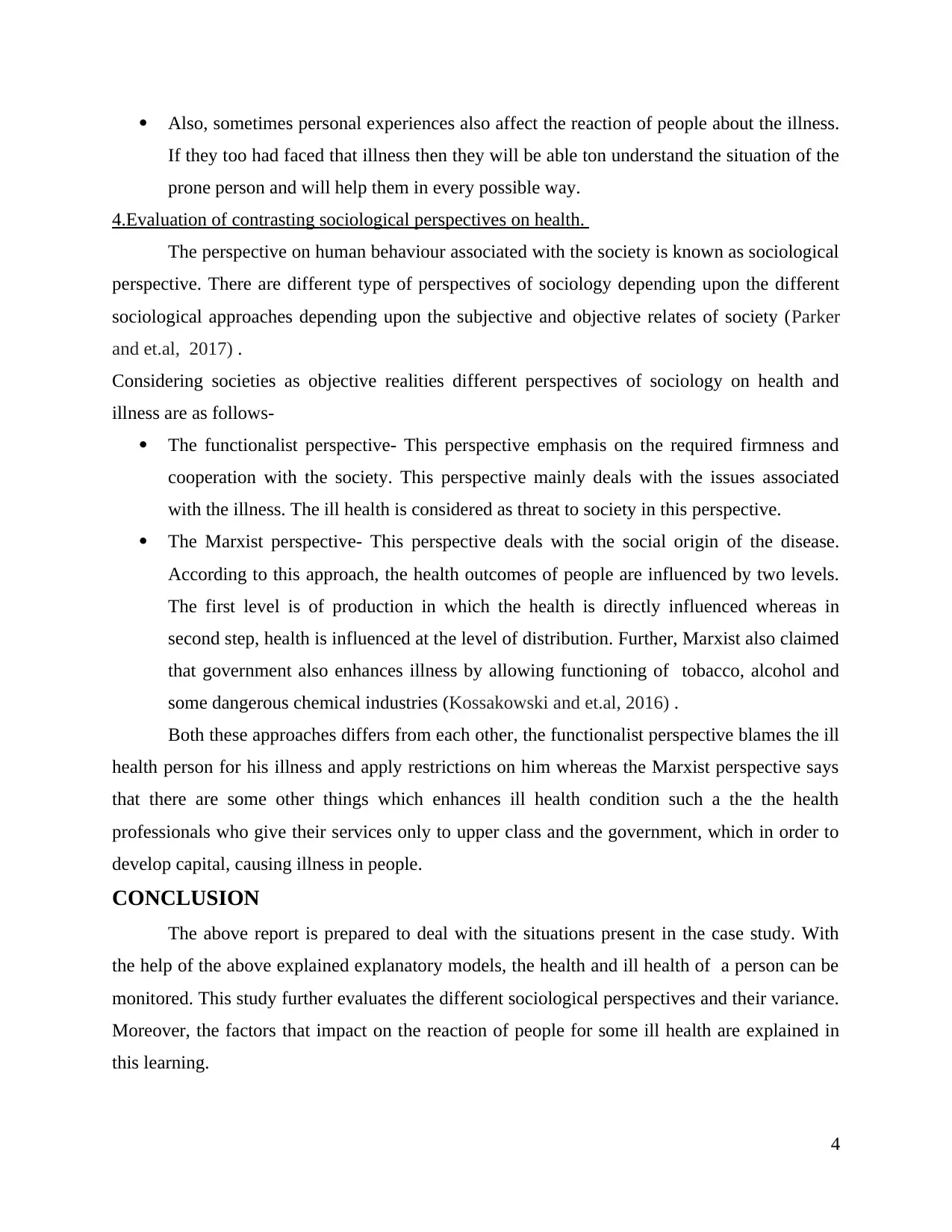
Also, sometimes personal experiences also affect the reaction of people about the illness.
If they too had faced that illness then they will be able ton understand the situation of the
prone person and will help them in every possible way.
4.Evaluation of contrasting sociological perspectives on health.
The perspective on human behaviour associated with the society is known as sociological
perspective. There are different type of perspectives of sociology depending upon the different
sociological approaches depending upon the subjective and objective relates of society (Parker
and et.al, 2017) .
Considering societies as objective realities different perspectives of sociology on health and
illness are as follows-
The functionalist perspective- This perspective emphasis on the required firmness and
cooperation with the society. This perspective mainly deals with the issues associated
with the illness. The ill health is considered as threat to society in this perspective.
The Marxist perspective- This perspective deals with the social origin of the disease.
According to this approach, the health outcomes of people are influenced by two levels.
The first level is of production in which the health is directly influenced whereas in
second step, health is influenced at the level of distribution. Further, Marxist also claimed
that government also enhances illness by allowing functioning of tobacco, alcohol and
some dangerous chemical industries (Kossakowski and et.al, 2016) .
Both these approaches differs from each other, the functionalist perspective blames the ill
health person for his illness and apply restrictions on him whereas the Marxist perspective says
that there are some other things which enhances ill health condition such a the the health
professionals who give their services only to upper class and the government, which in order to
develop capital, causing illness in people.
CONCLUSION
The above report is prepared to deal with the situations present in the case study. With
the help of the above explained explanatory models, the health and ill health of a person can be
monitored. This study further evaluates the different sociological perspectives and their variance.
Moreover, the factors that impact on the reaction of people for some ill health are explained in
this learning.
4
If they too had faced that illness then they will be able ton understand the situation of the
prone person and will help them in every possible way.
4.Evaluation of contrasting sociological perspectives on health.
The perspective on human behaviour associated with the society is known as sociological
perspective. There are different type of perspectives of sociology depending upon the different
sociological approaches depending upon the subjective and objective relates of society (Parker
and et.al, 2017) .
Considering societies as objective realities different perspectives of sociology on health and
illness are as follows-
The functionalist perspective- This perspective emphasis on the required firmness and
cooperation with the society. This perspective mainly deals with the issues associated
with the illness. The ill health is considered as threat to society in this perspective.
The Marxist perspective- This perspective deals with the social origin of the disease.
According to this approach, the health outcomes of people are influenced by two levels.
The first level is of production in which the health is directly influenced whereas in
second step, health is influenced at the level of distribution. Further, Marxist also claimed
that government also enhances illness by allowing functioning of tobacco, alcohol and
some dangerous chemical industries (Kossakowski and et.al, 2016) .
Both these approaches differs from each other, the functionalist perspective blames the ill
health person for his illness and apply restrictions on him whereas the Marxist perspective says
that there are some other things which enhances ill health condition such a the the health
professionals who give their services only to upper class and the government, which in order to
develop capital, causing illness in people.
CONCLUSION
The above report is prepared to deal with the situations present in the case study. With
the help of the above explained explanatory models, the health and ill health of a person can be
monitored. This study further evaluates the different sociological perspectives and their variance.
Moreover, the factors that impact on the reaction of people for some ill health are explained in
this learning.
4
⊘ This is a preview!⊘
Do you want full access?
Subscribe today to unlock all pages.

Trusted by 1+ million students worldwide
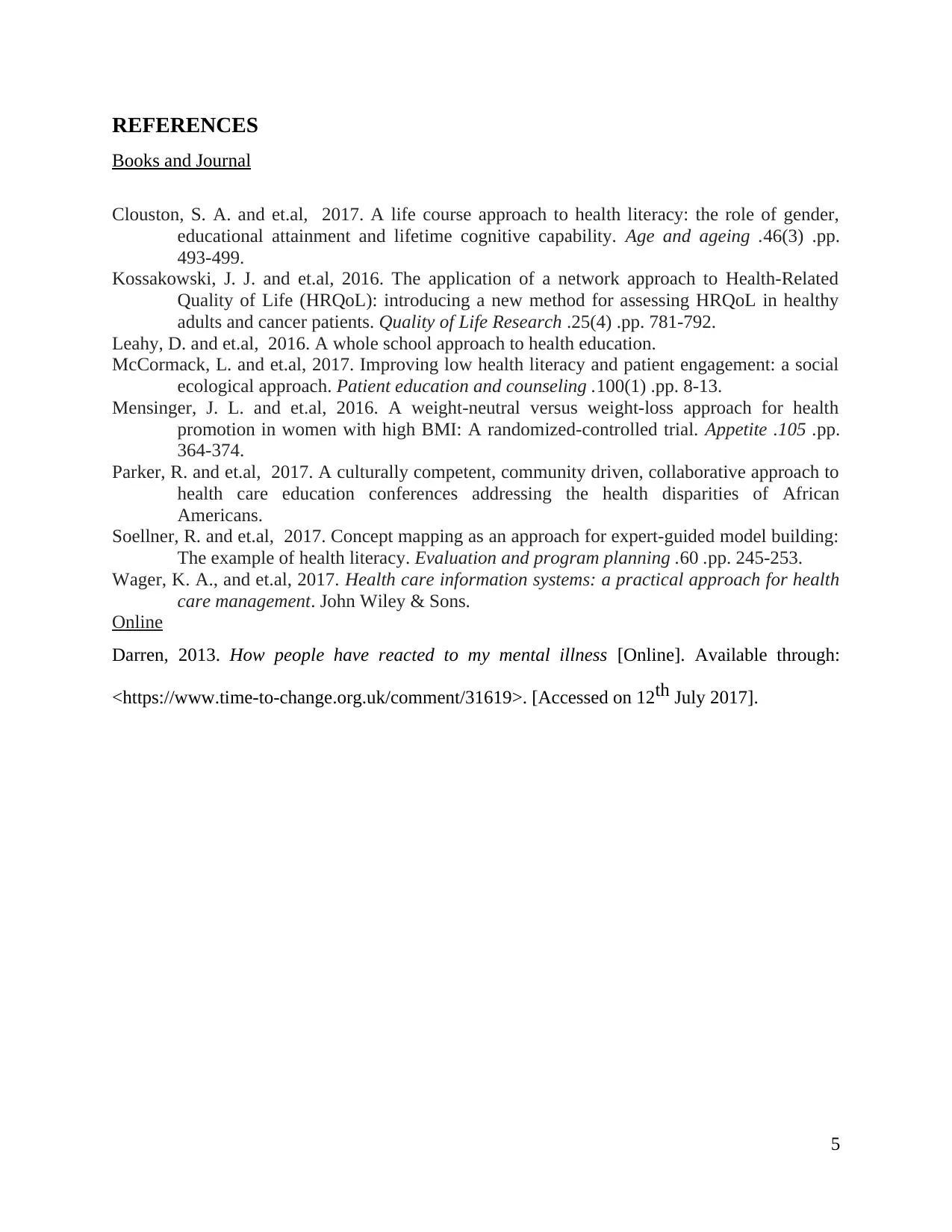
REFERENCES
Books and Journal
Clouston, S. A. and et.al, 2017. A life course approach to health literacy: the role of gender,
educational attainment and lifetime cognitive capability. Age and ageing .46(3) .pp.
493-499.
Kossakowski, J. J. and et.al, 2016. The application of a network approach to Health-Related
Quality of Life (HRQoL): introducing a new method for assessing HRQoL in healthy
adults and cancer patients. Quality of Life Research .25(4) .pp. 781-792.
Leahy, D. and et.al, 2016. A whole school approach to health education.
McCormack, L. and et.al, 2017. Improving low health literacy and patient engagement: a social
ecological approach. Patient education and counseling .100(1) .pp. 8-13.
Mensinger, J. L. and et.al, 2016. A weight-neutral versus weight-loss approach for health
promotion in women with high BMI: A randomized-controlled trial. Appetite .105 .pp.
364-374.
Parker, R. and et.al, 2017. A culturally competent, community driven, collaborative approach to
health care education conferences addressing the health disparities of African
Americans.
Soellner, R. and et.al, 2017. Concept mapping as an approach for expert-guided model building:
The example of health literacy. Evaluation and program planning .60 .pp. 245-253.
Wager, K. A., and et.al, 2017. Health care information systems: a practical approach for health
care management. John Wiley & Sons.
Online
Darren, 2013. How people have reacted to my mental illness [Online]. Available through:
<https://www.time-to-change.org.uk/comment/31619>. [Accessed on 12th July 2017].
5
Books and Journal
Clouston, S. A. and et.al, 2017. A life course approach to health literacy: the role of gender,
educational attainment and lifetime cognitive capability. Age and ageing .46(3) .pp.
493-499.
Kossakowski, J. J. and et.al, 2016. The application of a network approach to Health-Related
Quality of Life (HRQoL): introducing a new method for assessing HRQoL in healthy
adults and cancer patients. Quality of Life Research .25(4) .pp. 781-792.
Leahy, D. and et.al, 2016. A whole school approach to health education.
McCormack, L. and et.al, 2017. Improving low health literacy and patient engagement: a social
ecological approach. Patient education and counseling .100(1) .pp. 8-13.
Mensinger, J. L. and et.al, 2016. A weight-neutral versus weight-loss approach for health
promotion in women with high BMI: A randomized-controlled trial. Appetite .105 .pp.
364-374.
Parker, R. and et.al, 2017. A culturally competent, community driven, collaborative approach to
health care education conferences addressing the health disparities of African
Americans.
Soellner, R. and et.al, 2017. Concept mapping as an approach for expert-guided model building:
The example of health literacy. Evaluation and program planning .60 .pp. 245-253.
Wager, K. A., and et.al, 2017. Health care information systems: a practical approach for health
care management. John Wiley & Sons.
Online
Darren, 2013. How people have reacted to my mental illness [Online]. Available through:
<https://www.time-to-change.org.uk/comment/31619>. [Accessed on 12th July 2017].
5
1 out of 7
Related Documents
Your All-in-One AI-Powered Toolkit for Academic Success.
+13062052269
info@desklib.com
Available 24*7 on WhatsApp / Email
![[object Object]](/_next/static/media/star-bottom.7253800d.svg)
Unlock your academic potential
Copyright © 2020–2026 A2Z Services. All Rights Reserved. Developed and managed by ZUCOL.





